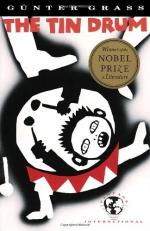|
|
The Tin Drum Chapter 34: Growth in a Freight Car
Chapter 34: Growth in a Freight Car
Oskar says that to this day, the aches and pains of growth are with him still - he grinds his teeth to keep the sounds in his joints down. His fingers are swollen; he cannot hold his drumsticks to drum, or his fountain pen to write. He thus turns his story over to his keeper, Bruno, to relate the story of his train trip to the west with Maria and Kurt.
Bruno says that although he has other patients in the mental hospital, Oskar is his most harmless - Bruno never has to call other nurses to subdue him. Bruno says that he will take the story about to be related and transform it into a piece of his knotted string art, calling it "Refugee from the East." He has made others as well, such as "Potato in Four Skirts," of Anna Koljaiczek, "Columbus," of Joseph Koljaiczek, "The Beautiful Fish Eater," of Agnes Matzerath, "The Two Skat Players," of Alfred Matzerath and Jan Bronski, and "Rough Going," of Herbert Truczinski.
Oskar, Kurt, and Maria pulled out in the freight car on June 12, 1945. There were thirty-two other people in the car, including four Franciscan nuns, and a young girl Oskar insists was Lucy Rennwand. This was not the girl's real name (it was Regina Raek), but Oskar insisted on calling her Lucy. This girl was traveling with her parents, grandparents, and a sick uncle who had cancer of the stomach. The uncle identified himself loudly as a Social Democrat. Everyone in the car was sitting or lying on straw. The train was stopped often in open fields by bands of Polish gangsters, who would open the sliding doors and leave with some of the travelers' luggage. When this would happen, the nuns would hold up their crosses in defense; the young gangsters never failed to cross themselves before taking the passengers' luggage. The sick uncle held up a paper saying he was an attested member of the Social Democratic Party; the boys knocked the paper aside and took his family's luggage.
The boys made a good impression on Oskar, for their leader reminded him of Störtebaker. When this boy was taking Maria's knapsack, Oskar reached in and quickly pulled out his family's photograph album. Oskar showed the boy a picture of his grandmother; the boy took someone else's suitcase. Also in the bag were the tax vouchers from the Matzerath store, the Ruby necklace that Oskar helped Jan steal for Agnes, and the Rasputin-Goethe medley. Between bouts of growing pains in his joints, Oskar looked over the two volumes. Oskar tells Bruno that the constant jarring of the train both promoted his growth and saved him from the terrible shooting pains he experienced when the train stopped for the gangsters. Several of the young gangsters took an interest in Oskar's photo album; he showed them each one of the photos, but had to scratch out Matzerath's Party pin when one Polish partisan got offended. Bruno, however, becomes skeptical of Oskar, and doubts his credibility. He says:
"But Mr. Matzerath himself is unable to keep his story running in a straight line. Take those four nuns in the freight car. First he refers to them as Franciscans, and the next time he calls them Vincentians. But what throws his story out of kilter more than anything else is this young lady with her two names and her one supposedly foxlike face. To be really conscientious, I should have to write two or more separate versions of his journey from the East to the West. But that kind of thing is not in my line. I prefer to concentrate on the Social Democrat, who managed with one name and, my patient assures me, one story, which he repeated incessantly until shortly before Stolp, to the effect that up to 1937 he had been a kind of partisan, risking his health and sacrificing his free time pasting posters, for he had been one of the few Social Democrats to put up posters even when it was raining." Chapter 34, pg. 424
Topic Tracking: Individuality/Identity 14
When the Social Democrat refused to take off his suit for a band of gangsters, and instead told his poster story again, he was kicked in the stomach. He vomited, then began to vomit blood. He died that night, blaspheming God and summoning the cause of the worker.
The gangsters' visits became shorter; there was little left to take. Oskar says he grew three and a half to four inches between Danzig and Stettin. In Lüneburg, Oskar was taken to a hospital on account of a high fever. Kurt and Maria were forced to stay in a refugee camp on the city's outskirts. Maria got permission from the doctors to move Oskar to Düsseldorf, near Maria's sister, Guste. From August 1945 to May 1946, Oskar lay in Düsseldorf City Hospital, where Oskar became enamored with the nurses.
Taking up his own pen again, Oskar says that Bruno has just measured him, and he has grown an inch, to four foot two. He has left to run and tell a doctor of the growth.




